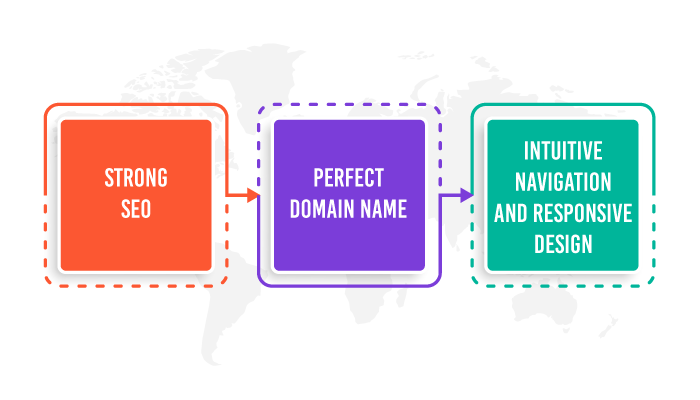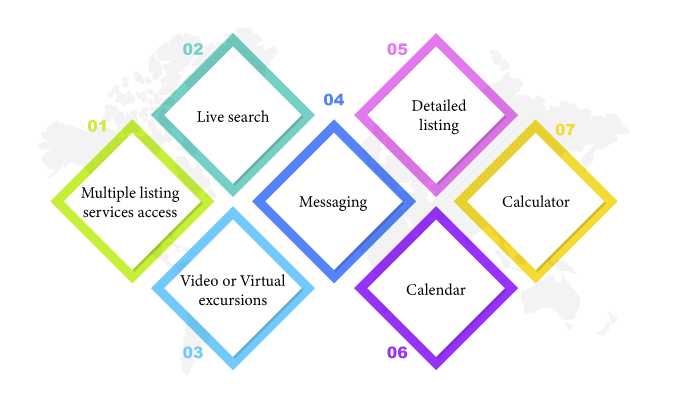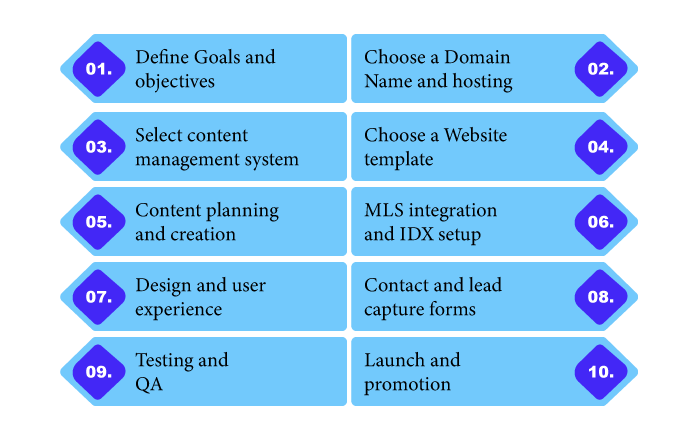Want to create a real estate agent website and wondering where to get started don’t worry we got you covered.
As we are all familiar with the competitive landscape of the Real estate market and to thrive in the competition real estate website is a must. Today, people search on the web not only for entertainment but also for services that provide real value and information to them.
Moreover, the National Association of Realtors report, shows that 47% of buyers look for online properties for sale before buying a home. This is why for the real estate market, it is essential to create a real estate website so that clients can make better purchasing decisions.
The current report shows that the value of the Real estate market is projected to reach US $613.60 Tn in 2023. With value is expected to show an annual growth rate of 3.52% at CAGR 2023-2028.
With this, around 80% of the real estate industry has moved to the web which makes property search more accessible and convenient for users.
So, whether you are a real estate agent, broker, or entrepreneur who wants to invest in real estate website development, we will help you to create a real estate agent website with robust features.
Why You Should Create A Real Estate Agent Website?

Creating a real estate agent website has numerous benefits for the real estate business. One is to thrive in the competitive landscape, and the other is to have a strong online presence for reaching potential clients.
Moreover, there are several other benefits of creating a real estate agent website most important it helps create leads and better for brand awareness.
Let’s look at a few more important benefits of creating a real estate agent website.
Lead generation
In the first place, with a real estate agent website, you can generate potential leads and get engaging customers. The main aim of a website is to create good-quality traffic and attract potential clients.
Increased visibility
A website allows you to showcase your listing, services, and expertise to a global audience. On the other hand, potential clients will easily find you through online searches.
Credibility and professionalism
To the point, a well-designed and informative real estate website can enhance your credibility as a real estate professional. It will reflect your commitment to your business and helps you to appear trustworthy to clients.
Cost-effective marketing
While compared with traditional ways of marketing methods such as print media and physical brochures, it’s not an effective way to market your services and listings.
With real estate agent websites, you can update information, add new listings, and make changes without incurring significant costs.
Time-saving
Time is money. And the most important part of realtors’ jobs is to close deals with long lists of paperwork and visit sites with clients and others. These tasks can easily be managed with the help of a feature-rich real estate website.
What Website Do Real Estate Agents Use?

Real estate agents use a variety of websites, platforms, and real estate CRM software to enhance their online presence and promote their services. Let’s discuss down below.
IDX real estate website
Internet data exchange real estate website is a powerful tool that displays up-to-date MLS (Multiple listing service) properties directly on the website.
Moreover, it enables potential buyers to search for properties, view detailed listing information, and connect for inquiries. This custom website development is good when it provides valuable information to the clients.
Local multiple listing services (MLS)
MLS websites are widely used by real estate agents to list and search for properties within a specific region. These platforms are essential for collaboration and networking within the real estate industry.
Personal websites
Many real estate agents create their personalized websites to showcase their listings, services, and expertise. Platforms like WordPress, Wix, Squarespace, and Weebly make it relatively easy to design and manage a professional-looking website.
With this being said, let’s look at some of the best websites that real estate agents use.
Best Websites For Real Estate Agents
| Realtor.com | It’s a leading online real estate marketplace that provides agents with a platform to list their properties. |
| Zillow
| It is also a well-known online real estate platform that offers property listing, home value estimates, and a variety of tools for buyers & agents. |
| Trulia
| Now this one is owned by the Zillow group, focused on property listing, local market trends, and neighborhood information. |
| Redfin
| It’s a real estate brokerage that operates online, providing property listings, buyer and seller tools, and a network of agents. |
| Houzz
| This app offers a Find a Pro section where real estate agents can showcase their services. |
Requirements To Create a Real Estate Agent Website

Strong SEO
We have discusses already that having a website for business brings several benefits. Now if you are ready to build websites for real estate agents, first start a blog on their website. This will help them to create more leads.
If your content is relevant it will rank on search engines and the real estate market is already dominated by the giants like Trulia, Zillow, and Realtor.com. So it’s better to hire third-party SEO specialists that can help your website get a good ranking.
Perfect domain name
The most crucial step for your website as it’s equally important as SEO. It’s better to choose a domain very thoughtfully as it’s one time effort. So make sure you choose the domain of the website for real estate agents very carefully.
Here are some tips to keep in mind:
- Domain should resonate with your brand identity and make sure to keep it short.
- Try to use keywords that resonate real estate industry
- Don’t use funky spellings
- Refrain from using abbreviations or acronyms.
Intuitive navigation and responsive design
Sometimes, a real state website contains so much information it becomes hard to navigate. On the other hand, some of the best websites for real estate agents focus on providing a good user experience to their users.
So, make sure to provide these necessities to your site:
- Contact page
- About US page
- Users can get to any page from any page
- Easy to navigate menu
Must-Have Features Of A Real Estate Website

Features are the main pillar of any website, so before we start real estate website development. Choose the right features that help you with the development.
Multiple listing services access
A robust real-state website design and development guide should emphasize the significance of connecting users seamlessly to MLS data. Although this feature allows sellers and property owners to have property accessible and visible to multiple agents.
However, the entire integration procedure is managed and configured in a user-friendly manner, ensuring convenience. An essential aspect of this integration is the Internet data exchange (IDX) a mechanism that empowers the extraction of listing data from MLSs and seamless incorporation into your real estate website.
Live search
For giving accurate results this feature is a must. For this, you have to provide users with features such as listing, home type, price and number of bedrooms, and more.
Moreover, this feature is a prime example of how technology can elevate user experience in the real estate sector. This implementation reflects your commitment to user-centric design, helping potential buyers quickly find their dream properties while showcasing your website’s sophistication and efficiency.
Video or Virtual excursions
This is the most important feature of a real estate agent website. The video and virtual tours offer an immersive insight into properties, surpassing even high-quality images.
While videos provide an excellent option, AR and VR take it a step further. Plus, these technologies offer users an understanding of both exterior and interior spaces.
Messaging
Smooth communication is vital in real estate. Buyers must convey their needs, while sellers and agents respond effectively. An integrated messaging tool, like live chat for swift feedback or direct text, voice, and video messaging ensures seamless interaction connecting all parties efficiently.
Additionally, this aids buyers and sellers, and realtors in seamless communication, ensuring efficient feedback and direct connections.
Detailed listing
Prospective buyers and tenants seek comprehensive property information. This feature helps in displaying details effectively on your site.
For instance, color-coded neighborhoods provide location clarity, this feature showcases abundant data like demographics, crime rates, and real estate prices.
Calendar
Also, seamlessly connect with a calendar tool, with this feature property owners, realtors, and clients can collaborate, view and modify event details. Sync profiles with Google Calendar or Apple Calendar for added convenience.
Calculator
A financial tool assesses house affordability and considers income, mortgage terms, and more. It also highlights buying vs. renting costs.
Moreover, empower users with insights into their real estate options.
Steps By Step Guide To Real Estate Agent Website Development

Creating a real estate agent website involves several steps to ensure a professional user-friendly and effective online presence.
Here are step-by-step guides to help you navigate the process:
Define Goals and objectives
Before starting real estate agent website development, determine the purpose of your website. By identifying whether it’s primarily for showcasing listing, generating leads, establishing your brand, or offering educational content.
Choose a Domain Name and hosting
We already discussed the importance of domain names. In this step choose a reliable web hosting provider to ensure your website’s stability and performance.
Select a content management system
Now opt for user-friendly CMS like WordPress that offers customizable themes and plugins to streamline your website development.
Choose a Website template
Selecting a responsive website template or theme that suits your real estate business’s style and needs. Also, ensure the template is mobile-friendly for a better user experience.
Content planning and creation
Also, develop engaging content for your website, including property listings, blog posts, about us, and contact information.
Plus, make sure to include high-quality images and videos it helps enhance the visual appeal.
MLS integration and IDX setup
Another step is to integrate your website with MLS data using internet data exchange. This allows you to display up-to-date property listing directly from the MLS database.
Design and user experience
In this step craft a clean, intuitive design that emphasizes user experience. Also, ensure that your website is easy to navigate, has clear calls to action, and visually appealing layout.
Contact and lead capture forms
The most crucial step is to create contact forms and lead capture mechanisms to collect user inquiries and information. Don’t forget to implement a CRM system to manage and follow up with leads effectively.
Testing and QA
After the completion of real estate website development thoroughly test your website and launch it to the public. By promoting it through your social media channels, email, newsletters, and other marketing efforts.
Launch and promotion
Once you are satisfied with the website, launch it to the public. By promoting through social media channels, email newsletters, and other marketing efforts.
Regular updates and maintenance
Lastly, keep your website up to date with fresh content, new listing, and software updates. If you want your website to perform better make sure to not forget this step.
How Much Does It Cost To Create A Real Estate Agent Website?

The average cost of creating a real estate website is between $5,000 and $15,000. However, the cost can range from as low as $1,000 to as high as $50,000 or more. The specific cost will depend on the factors listed above.
If you are on a budget, you may be able to create a basic real estate website yourself using a platform like WordPress or Wix. However, if you want a more complex website with more features, you will likely need to hire a real estate app development company. A web developer can create a custom website for you that meets your specific needs and budget.
Here are some tips for creating a real estate website on a budget:
- Use a free or low-cost platform like WordPress or Wix.
- Choose a simple design and avoid custom features.
- Use free or low-cost images and videos.
- Do your SEO research and optimization.
- Market your website on social media and other online channels.
Conclusion
Whether you run a real estate business or are willing to invest in this niche in 2023, a real estate website is a must. With this, every agent should consider real estate agent website development.
With a custom website, it’s easy to modify and include features according to your convenience. All you have to do is find a reliable partner and you are good to go.
However, we are experts in developing real estate agent websites or apps, if you planning to invest in one, feel free to contact us.
FAQ
A real estate agent’s website serves as an online platform to showcase property listings, connect with potential clients, and establish a professional online presence.
Essential features include MLS integration for updated listings, user-friendly search options, detailed property pages, contact forms, and responsive design for optimal mobile experience.
MLS integration connects your website to local property databases, displaying up-to-date listings. Internet Data Exchange (IDX) technology facilitates this, offering users a comprehensive view of available properties.
Costs vary based on factors like complexity, design, features, and customization. Basic websites may start at a few thousand dollars, while more advanced, custom sites can range from $5,000 to $10,000 or more.
Yes, pre-designed templates are cost-effective and efficient. They provide a foundation for your site’s design and functionality, which can then be customized to align with your brand.
Promote your website through social media, email marketing, search engine optimization (SEO), and paid advertising. Engage with your target audience and share valuable content to drive traffic.
Responsive design ensures your website functions well on various devices, including smartphones and tablets. It enhances user experience and is crucial for SEO ranking.
Yes, integrating a booking calendar lets users schedule property viewings with ease. It streamlines interactions between agents, property owners, and potential buyers.

Niketan Sharma is the CTO of Nimble AppGenie, a prominent website and mobile app development company in the USA that is delivering excellence with a commitment to boosting business growth & maximizing customer satisfaction. He is a highly motivated individual who helps SMEs and startups grow in this dynamic market with the latest technology and innovation.
Table of Contents












No Comments
Comments are closed.